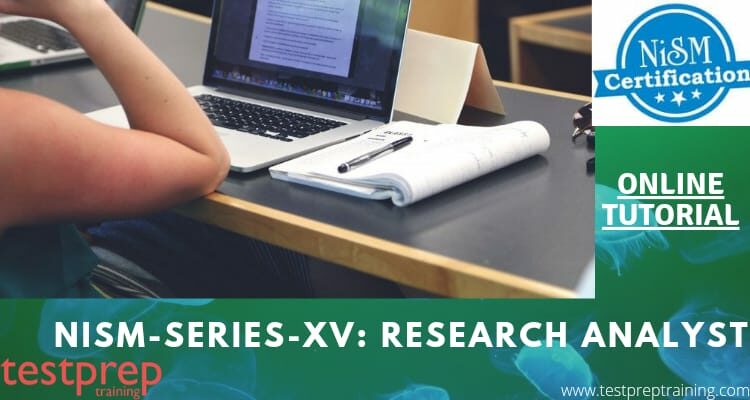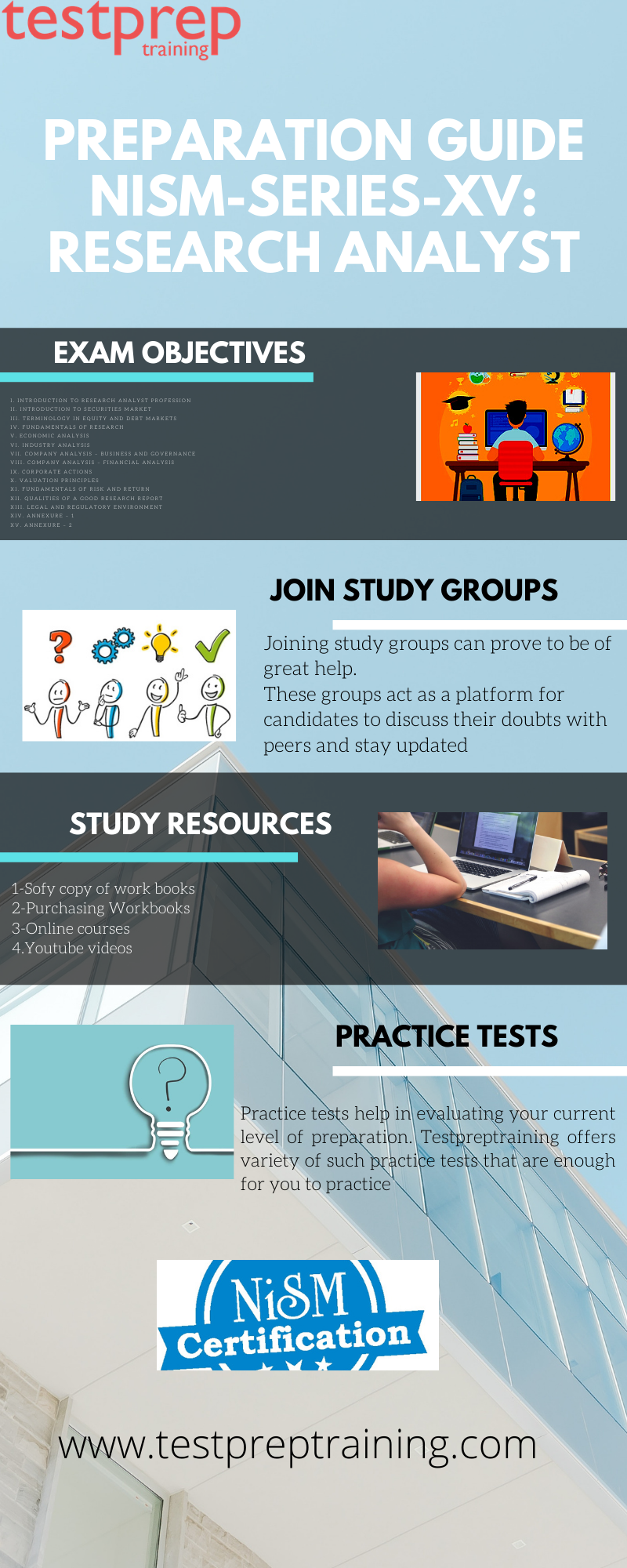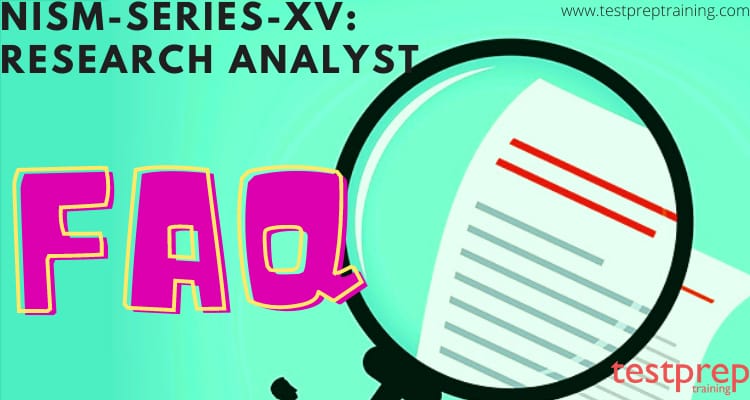NISM Series-XV: Research Analyst

The NISM Series-XV: Research Analyst certification aims to improve the quality of services that are provided by the research analysts in the financial services sector. This test essentially establishes a minimal knowledge level for those registered as research analysts under the SEBI (Research Analyst) Regulations, 2014, as well as those involved in the creation and dissemination of research analyses, as well as research analysts and their partners. The notable people must pass the NISM Series-XV: Research Analyst test in order to meet the requirements outlined in Regulation 7(2) of the SEBI (Research Analysts) Regulations, 2014.
Benefits of the exam:
Moreover, passing the NISM Series-XV: Research Analyst examination will enable you to-
- Know the fundamentals of Indian Securities Markets along with various terminologies that are used in equity and debt markets
- Gain knowledge about the top down and bottom up approach of fundamental research
- Understand the basic concepts for micro and macro-economic analysis, the sources of different information for analysis, and the different macroeconomic variables affecting the analysis.
- Understand the qualities of a good research report.
- Know about the key industry drivers and the information sources for industry analysis.
- Understand the qualitative and quantitative dimensions with regards to company analysis.
- Know about the fundamentals of Risk and Return, valuation principles, and also the philosophy of various corporate actions.
Target Audience:
Well, the NISM Series-XV: Research Analyst exam is recommended for the following people:
- People registered as research analyst under SEBI (Research Analyst) Regulations, 2014.
- Individuals who are employed as research analyst or as partners of a research analyst.
- Persons engaged in preparation and publication of research report.
- Industry professionals
- Interested individuals
Scheduling the exam
So, you can apply for the exam following the steps given below:
- Register with the NISM Portal
- Use your email address and password to login
- Check availability of seats
- Schedule the test or enroll online
- Make payment using Credit Card / Debit Card/ Net Banking
- Download the Admit Card
- Download the Study material
- Access Exam Results
Rescheduling the exam
- You can reschedule your scheduled exam on your own by logging into NISM portal four days prior to the date of a scheduled exam.
- So, you may be offered rescheduling of the exam subject to availability of slots and that too only in certain cases such as:
- Significant / prolonged disruption of internet / power at the test center
- Non-availability of NISM’s examination application due to scheduled or unscheduled maintenance
- Inability of NISM or test administrator to conduct examination/s because of circumstances like natural disasters, law and order situation etc.
Special Accommodation Policy
- If you require special accommodations when taking the NISM Series-XV: Research Analyst exam, you must notify NISM in advance.
- Therefore, you have to send the Special Accommodation form to NISM at least 30 days in advance in order to get assistance for special accommodations.
- So, you will be given the approval/denial for Special Accommodation by NISM after assessing its need at its sole discretion.
Exam Details
Moreover, it is a very important thing to note the pattern of exam, number of questions asked, time allotted and other minor details. So, we have mentioned the important details of the NISM Series-XV: Research Analyst exam as follows:
- Type of questions-Multiple-choice questions
- Time allotted-2hrs
- No. of questions-100
- Passing score-60%
- Fee-Rs. 1500+
For more details and any queries, visit the NISM Series-XV: Research Analyst Exam FAQs
NISM Series-XV: Research Analyst Exam Course Outline
The syllabus of exam has been categorized in various sections and subsections. So, let’s look into the various domains of the exam as follows:
DOMAIN 1. INTRODUCTION TO RESEARCH ANALYST PROFESSION
- Primary Role of a Research Analyst
- Primary Responsibilities of a Research Analyst
- Basic Principles of Interaction with Companies/Clients
- Important Qualities of a Research Analyst
DOMAIN 2. INTRODUCTION TO SECURITIES MARKET
- Introduction to Securities and Securities Market
- Product Definitions / Terminology
- Structure of Securities Market
- Various Market Participants and Their Activities
- Kinds of Transactions
- Dematerialization and Rematerialization of securities
DOMAIN 3. TERMINOLOGY IN EQUITY AND DEBT MARKETS
- Terminology in Equity Market
- Debt Market Terminology
- Types of Bonds
DOMAIN 4. FUNDAMENTALS OF RESEARCH
- What is Investing?
- The role of research in investment activity
- Technical Analysis
- Fundamental Analysis
- Quantitative Research
- Behavioral Approach to Equity Investing
DOMAIN 5. ECONOMIC ANALYSIS
- Basic Principles of Microeconomics
- Basic Principles of Macroeconomics
- Introduction to Various Macroeconomic Variables
- Role of economic analysis in fundamental analysis
- Secular, cyclical and seasonal trends
- Sources of Information for Economic Analysis
DOMAIN 6. INDUSTRY ANALYSIS
- Role of industry analysis in fundamental analysis
- Defining the industry
- Understanding industry cyclicality
- Market sizing and trend analysis
- Secular trends, value migration and business life cycle
- Understanding the industry landscape
- Key Industry Drivers and Industry KPIs
- Regulatory environment/framework
- Taxation
- Sources of information for industry analysis
DOMAIN 7. COMPANY ANALYSIS – BUSINESS AND GOVERNANCE
- Role of company analysis in fundamental research
- Understand Business and Business Models
- Pricing Power and Sustainability of This Power
- Competitive Advantages/Points of differentiation over the Competitors
- Strengths, Weaknesses, Opportunities and Threats (SWOT) Analysis
- Quality of Management and Governance Structure
- Risks in the Business
- History of credit rating
- ESG framework for company analysis
- Sources of Information for Analysis
DOMAIN 8. COMPANY ANALYSIS – FINANCIAL ANALYSIS
- Introduction to financial statement
- Stand-alone financial statement and consolidated financial statement
- Balance Sheet
- Basics of Profit and Loss Account (P/L)
- Statement of changes in shareholder’s equity
- Basics of Cash Flows
- Notes to accounts
- Important Points to Keep In Mind While Looking At Financials
- Reading audit report to understand the quality of accounting
- Financial statement analysis using ratios
- Commonly used ratios
- L. Dupont analysis
- M. Forecasting using ratio analysis
- N. Peer Comparison
- O. Other aspects to study from financial reports
DOMAIN 9. CORPORATE ACTIONS
- Philosophy of Corporate Actions
- Dividend
- Rights Issue
- Bonus Issue
- Stock Split
- Share Consolidation
- Merger and Acquisition
- Demerger / Spin-off
- Scheme of arrangement
- Loan Restructuring
- Buyback of Shares
- Delisting and relisting of Shares
- Share Swap
DOMAIN 10. VALUATION PRINCIPLES
- Difference Between Price and Value
- Why Valuations are required
- Sources of Value in a Business – Earnings and Assets
- Approaches to valuation
- Discounted Cash Flows Model for Business Valuation
- Relative valuation
- Earnings Based Valuation Matrices
- Assets based Valuation Matrices
- Relative Valuations – Trading and Transaction Multiples
- Sum-Of-The-Parts (SOTP) Valuation
- Other Valuation Parameters in New Age Economy and Businesses
- Capital Asset Pricing Model
- Objectivity of Valuations
- Some Important Considerations in the Context of Business Valuation
DOMAIN 11. FUNDAMENTALS OF RISK AND RETURN
- Concept of Return of Investment and Return on Investment
- Calculation of Simple, Annualized and Compounded Returns
- Risks in Investments
- Measuring risk
- Concepts of Market Risk (Beta)
- Sensitivity Analysis to Assumptions
- Concept of Margin of Safety
- Comparison of Equity Returns with Bond Returns
- Calculating risk adjusted returns
- Basic Behavioral Biases Influencing Investments
- Some Pearls of Wisdom from Investment Gurus across the World
- Measuring liquidity of equity shares
DOMAIN 12. QUALITIES OF A GOOD RESEARCH REPORT
- Qualities of a Good Research Report
- Checklist Based Approach to the Research Reports
- A Sample Checklist for Investment Research Reports
DOMAIN 13. LEGAL AND REGULATORY ENVIRONMENT
- Regulatory infrastructure in Financial Markets
- Important regulations in Indian Securities Market
- Code of Conduct for Research Analysts
- Management of Conflicts of Interest and Disclosure Requirements for Research Analysts
- Exchange surveillance mechanisms: GSM and ASM
DOMAIN 14. ANNEXURE – 1
DOMAIN 15. ANNEXURE – 2
Study guide for the NISM Series-XV: Research Analyst Exam
First of all, you should familiarize yourself with all the topics and subtopics that are there in the exam syllabus. This will help you have a good concept of what you’ll need to learn and how you’ll arrange your study time. Also, bear in mind that the actual application of what you learn is critical, so keep that in mind while you study. As a result, begin your preparation by properly reviewing the curriculum.

1. Explore the details of exam
Another aspect to consider before starting is to know all about the pattern of exam including details about the type and number of questions and also the time allotted. This will help you strategize your learning technique and will also help you manage your time while doing the exam.
2. Study resources
- NISM provides it’s workbooks for studying. You can order these workbooks online through Taxmann Publications Private Ltd.
- NISM provides videos of certain courses on Youtube. Therefore, you can access those videos for gaining more knowledge about the exam.
- Alongside, you can also go for online trainings provided by different platforms. This will help you in learning the basics at at greater pace. Moreover, self-study can also do the needful.
3. Join study groups
Getting involved in study groups and communities can also be beneficial. This serves as a platform that connects professionals and novices, allowing you to have your questions answered while also having constructive dialogues with individuals with similar backgrounds. As a result, joining these organisations will keep you up to date.
4. Practice tests
The last and the most important step of preparation is practicing questions. This has dual benefits as it helps you not only evaluate your level of preparation but also helps you boost your confidence by attempting challenging questions. The practice tests that we offer are definitely reliable and enough to practice in order to ace the exam. Here, we provide unique sets of professionally designed questions for you to practice.


